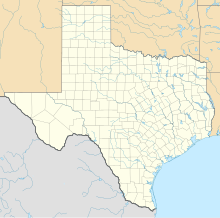Curtis Field
Curtis Field | |||||||||||
|---|---|---|---|---|---|---|---|---|---|---|---|
 USGS aerial image (13 January 1995) | |||||||||||
| Summary | |||||||||||
| Airport type | Public | ||||||||||
| Owner | City of Brady | ||||||||||
| Serves | Brady, Texas | ||||||||||
| Elevation AMSL | 1,827 ft / 556 m | ||||||||||
| Coordinates | 31°10′45″N 99°19′26″W / 31.17917°N 99.32389°W | ||||||||||
| Website | [1] | ||||||||||
| Map | |||||||||||
 | |||||||||||
| Runways | |||||||||||
| |||||||||||

Curtis Field (IATA: BBD, ICAO: KBBD, FAA LID: BBD) is a city-owned airport three miles northeast of Brady, in McCulloch County, Texas.[1] The airport is named for Mayor Harry L. Curtis of Brady, who proposed the site as an auxiliary field for the United States Army Air Forces (USAAF).[2] The FAA's National Plan of Integrated Airport Systems for 2009–2013 calls it a general aviation facility.[3]
History
[edit]Construction of the airport began in November 1940. The Works Progress Administration provided labor for the project with the city and county providing equipment for leveling and grading.[4] The airport opened in August 1941. On January 1, 1942, the facility was taken over by the United States Army Air Forces and was used during World War II as a primary (stage 1) pilot training airfield. Facilities at the 354-acre field included a headquarters building and annex, a ground school, an infirmary, mess hall, three barracks, and four hangars.
Known as Curtis Field, the facility was operated as a contract pilot school, operated initially by the Brady Aviation School for the USAAF Gulf Coast Training Center (later Central Flying Training Command). Later, the contract was taken over by the Dallas Aviation School and Air College.
Several local axillary landing airfields were associated with Curtis Field, the Curtis Ranch; Moore Field; Sneed Field and White Field for emergency and overflow landings.
It is notable that enlisted sergeant pilots received their primary flight training at Curtis Field in early 1942. This program was ended later in the year. The last pilot training class ended in February 1945 and military control of the airport ended.
Airline flights (Trans-Texas DC-3s) ended in 1958–59.
See also
[edit]References
[edit]- ^ a b FAA Airport Form 5010 for BBD PDF. Federal Aviation Administration. Effective 11 February 2010.
- ^ Stewart, Robert W. "Curtis Field". Handbook of Texas Online. Texas State Historical Association. Retrieved 18 March 2018.
- ^ National Plan of Integrated Airport Systems for 2009–2013: Appendix A: Part 5 (PDF, 1.18 MB) Archived June 6, 2011, at the Wayback Machine. Federal Aviation Administration. Updated 15 October 2008.
- ^ "Curtis Field Contributed Much to Brady's Progress". Brady Herald. September 12, 1972. Retrieved 18 March 2018.
- ^
 This article incorporates public domain material from the Air Force Historical Research Agency
This article incorporates public domain material from the Air Force Historical Research Agency
- ^ Shaw, Frederick J. (2004), Locating Air Force Base Sites, History’s Legacy, Air Force History and Museums Program, United States Air Force, Washington DC. OCLC 57007862, 1050653629
- ^ Manning, Thomas A. (2005), History of Air Education and Training Command, 1942–2002. Office of History and Research, Headquarters, AETC, Randolph AFB, Texas OCLC 71006954, 29991467
External links
[edit]- [2]
- FAA Terminal Procedures for BBD, effective October 31, 2024
- Resources for this airport:
- FAA airport information for BBD
- AirNav airport information for KBBD
- ASN accident history for BBD
- FlightAware airport information and live flight tracker
- NOAA/NWS weather observations: current, past three days
- SkyVector aeronautical chart, Terminal Procedures
- Airports in Texas
- Airfields of the United States Army Air Forces in Texas
- Buildings and structures in McCulloch County, Texas
- USAAF Contract Flying School Airfields
- 1941 establishments in Texas
- Transportation in McCulloch County, Texas
- Airports established in 1941
- USAAF Central Flying Training Command
- American Theater of World War II


